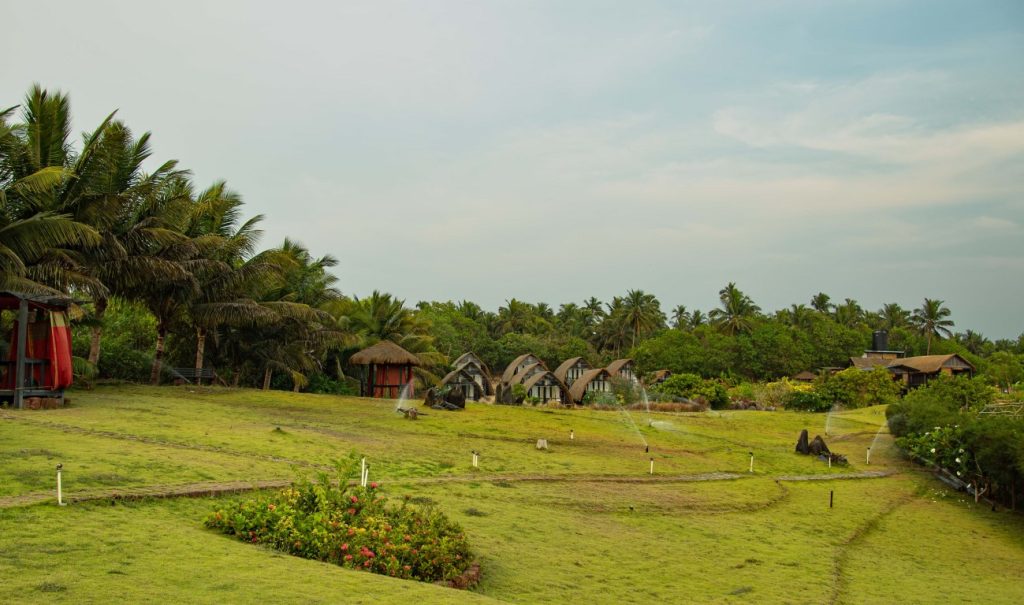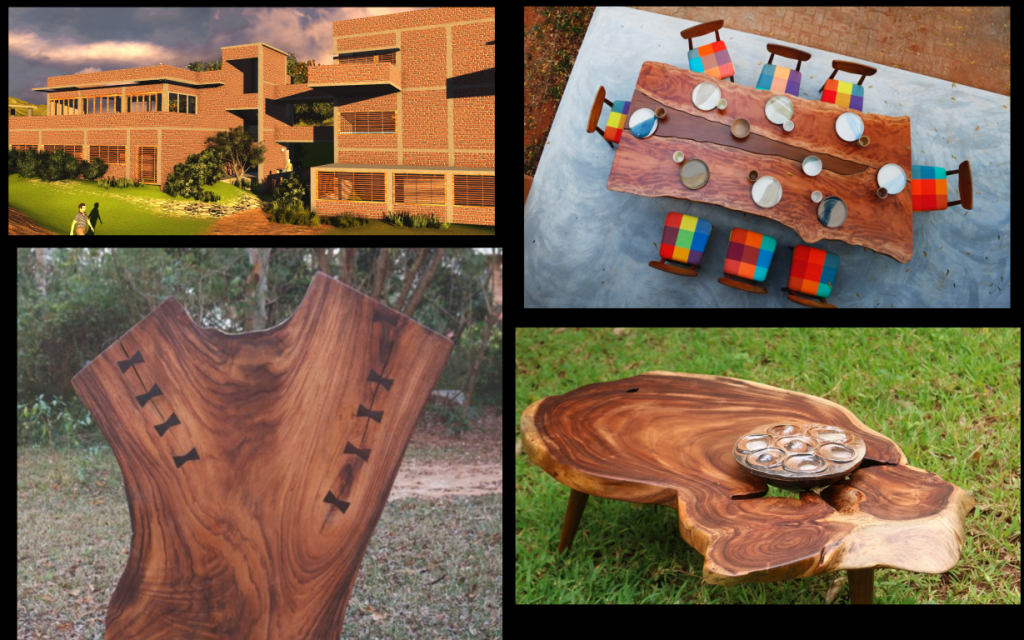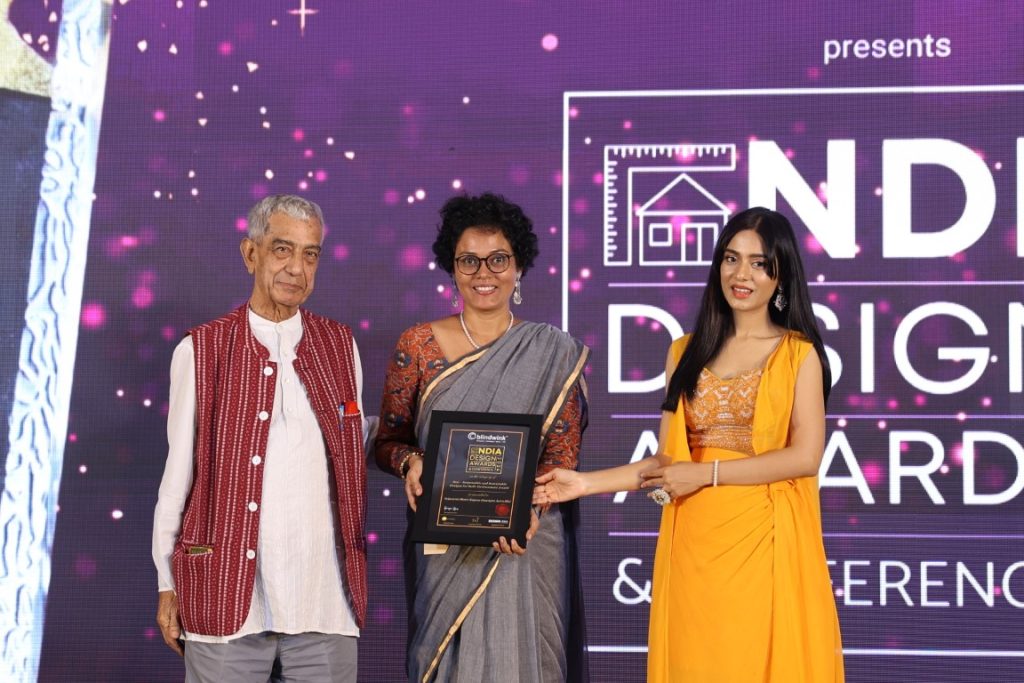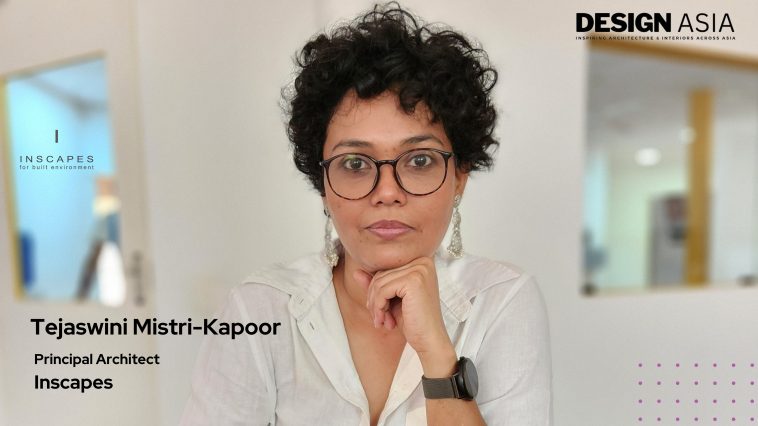Tejaswini Mistri-Kapoor’s journey into the world of architecture is a narrative woven with passion, creativity, and a profound sense of purpose. As the Principal Architect and Founder of Inscapes, her story is not just about designing buildings but about creating spaces that harmonize with their surroundings and enhance the lives of their inhabitants.
Initially, Tejaswini harbored a desire to study psychology, driven by an interest in understanding human behavior. However, a lack of right guidance and understanding led her to reconsider her path. It was her keen eye for design and an evolving sense of purpose that steered her towards architecture—a field that seamlessly blended her creative inclinations with a desire to contribute meaningfully to society. Tejaswini viewed architecture not merely as a profession but as a tool for addressing social and environmental challenges, sparking her commitment to creating spaces that resonate with both functionality and purpose.
Auroville: The Nexus of Inspiration
Tejaswini’s architectural philosophy was profoundly influenced by Auroville, an international township in southern India dedicated to human unity and sustainable living. For the past 22 years, Auroville has been both a home and a professional crucible for Tejaswini, shaping her approach to design and deepening her appreciation for the harmony between nature and the built environment.
Auroville’s ethos of conscious living and its experimental approach to design became the cornerstone of Tejaswini’s professional journey. The township’s focus on sustainable living, community-centric solutions, and holistic design principles inspired Tejaswini to create spaces that are not only functional but also nurturing and harmonious with their surroundings. This influence is evident in the projects she undertakes through her architectural practice.
The Birth of Inscapes: Merging Vision with Practice
In 2011, Tejaswini established Inscapes, an architectural studio located in Auroville, Tamil Nadu. The founding of Inscapes marked a significant milestone in her career, allowing her to fully immerse herself in her passion for architecture and design. The studio was born out of a vision to create spaces that resonate with their natural environment while enhancing the human experience.
Inscapes operates at the intersection of architecture, interior design, and furniture making, reflecting Tejaswini’s multifaceted approach to design. Her work spans various domains, driven by a commitment to creating environments that are functional, aesthetically pleasing, and in harmony with their surroundings. The studio’s projects are characterized by a dedication to sustainable practices, community-centric solutions, and a deep respect for the natural environment.
Woodscapes: A Sustainable Furniture Initiative
In 2012, Tejaswini expanded her creative horizons by launching Woodscapes, a furniture design venture based in Auroville. Woodscapes represents an extension of her commitment to sustainable design and her connection to nature. The initiative began with a unique approach: repurposing wood felled by a cyclone, transforming a natural disaster into an opportunity for creative and ecological responsibility.
Tejaswini’s approach to furniture design in Woodscapes is marked by minimalism, a focus on natural materials, and a profound respect for the environment. Influenced by George Nakashima, a pioneering figure in woodworking, Tejaswini values the natural beauty and imperfections of wood. Her designs honor these qualities, reflecting Nakashima’s philosophy of integrating craftsmanship, spirituality, and nature.
Navigating Challenges: Balancing Creativity with Business
Tejaswini’s entrepreneurial journey has not been without its challenges. Balancing the creative and business aspects of architecture has been a significant hurdle. While her architectural training provided her with the skills to design and manage projects, financial management and client acquisition presented ongoing challenges. Finding clients who align with her philosophy of balancing human needs, nature, and economy has been particularly challenging.
To address these challenges, Tejaswini has employed several strategies. One key strategy is the Integrative Design Process, which involves a collaborative approach to planning that integrates social, environmental, and economic factors. This process ensures that projects are designed with a holistic perspective, addressing the needs of the community, the environment, and the economy.
Another strategy is the incorporation of Sustainable Practices in her projects. Tejaswini emphasizes the use of energy-efficient technologies, renewable energy sources, and water-saving strategies. Her designs aim to maximize energy efficiency through solar passive principles, high-performance insulation, and rainwater harvesting. These practices help mitigate the negative environmental impact of buildings and promote sustainability.
Human-Centered Design is another cornerstone of Tejaswini’s approach. Her projects are designed to promote comfort, health, and well-being by considering factors such as natural lighting, ventilation, and acoustics. For larger projects, she involves the local community in the planning process to ensure that the design meets their needs and enhances their quality of life. This participatory approach ensures that the design aligns with the community’s values and preferences.
Nature Integration is a fundamental aspect of Tejaswini’s design philosophy. She incorporates natural elements into her designs to connect occupants with nature. This can include green roofs, living walls, indoor plants, and natural materials. Her designs respond to the local climate and geography, minimizing the environmental footprint and preserving existing ecosystems and biodiversity.
These strategies not only address the challenges Tejaswini faces but also enhance the impact of her work on society and the environment. Her ability to navigate these complexities with resilience and creativity has been a defining aspect of her entrepreneurial journey.
Inspirations and Influences: A Legacy of Learning
Tejaswini’s professional journey has been shaped by her mentors and personal experiences. Working with renowned architects such as Ar. Ajit Koujalgi, Ar. Suhasini Ayre, and Ar. B V Doshi has had a profound impact on her approach to architecture.
Ar. Ajit Khoujalji taught Tejaswini the importance of work ethics and dedication to the craft. His influence instilled in her a commitment to the ethical aspects of architecture. Her experience with Ar. Suhasini Ayre provided her with technical expertise and a deeper understanding of architectural practice. Ayre’s guidance helped Tejaswini refine her skills and broaden her technical knowledge.
Ar. Ajit Koujalgi taught Tejaswini the importance of work ethics and dedication to the craft. His influence instilled in her a commitment to the ethical aspects of architecture. Her experience with Ar. Suhasini Ayre provided her with technical expertise and a deeper understanding of architectural practice. Ayre’s guidance helped Tejaswini refine her skills and broaden her technical knowledge.
Ar. B V Doshi, a legendary figure in architecture, taught Tejaswini that architecture is not merely a profession but a way of life. Doshi’s holistic approach to design and his emphasis on cultural and contextual sensitivity deeply resonated with Tejaswini, shaping her own approach to architecture.
Although Tejaswini did not work directly with George Nakashima, his work has been a significant source of inspiration for her furniture designs. Nakashima’s integration of craftsmanship, spirituality, and nature has influenced Tejaswini’s approach to woodworking. She admires Nakashima’s philosophy of honoring the natural beauty and imperfections of wood, and this philosophy is reflected in her designs.
Nature remains Tejaswini’s greatest source of inspiration. She finds immense satisfaction in observing and drawing from the natural world. Her designs reflect a deep respect for the environment and a commitment to creating spaces that are both functional and harmonious with their surroundings. Tejaswini believes that nature’s support is vital unless it is exploited, and this philosophy guides her work.
Inscapes has made a significant impact on society through its projects. Tejaswini’s designs aim to shape the built environment in ways that influence social dynamics, cultural expression, and the quality of life. Her specialization in sustainable architecture addresses the environmental impact of buildings by implementing energy-efficient technologies and promoting responsible resource use. Her designs focus on enhancing physical and mental well-being by integrating natural light, green spaces, and pedestrian-friendly infrastructure.
Looking to the future, Tejaswini envisions a continued commitment to sustainable and human-centered design. Her business aims to embrace evolving trends in architecture while staying true to its core principles. The focus will remain on creating spaces that not only meet functional needs but also contribute positively to the environment and the community.
Lessons Learned: Resilience and Empathy
Tejaswini’s journey has imparted valuable lessons in resilience and patience. Managing long-term projects and navigating the complexities of architecture and construction has strengthened her confidence in her creative abilities and decision-making. The profession has also highlighted the importance of being sensitive to cultural and local contexts, offering a rich tapestry of learnings that extend beyond technical expertise.
For budding architects and designers, Tejaswini’s message is clear: embrace curiosity, respect the environment, and design with empathy. She encourages young professionals to explore new materials, study diverse architectural styles, and immerse themselves in different cultures. While artificial intelligence plays a role in modern design, Tejaswini advises maintaining creativity and intuition, using technology as a tool rather than a crutch.
Project Highlights:


Golven Beach Resort at Vengurla. Located in an ecologically sensitive area within the Coastal Regulation Zone (CRZ), the project involved placing structures carefully to preserve the dunes and ensure unobstructed ocean views. The use of local materials such as laterite, bamboo, and thatch, combined with the absence of cement, exemplifies Tejaswini’s commitment to environmentally responsible design. The project’s success lies in its thoughtful approach to site selection and material use.
Versa Drive Campus in Coimbatore inculcates regional architectural elements, at the same time expresses the minimalistic aspect of it to achieve the optimal industrial setup. The whole building complex has two courtyards with elegant water surrounded by functional spaces for testing, production, research and development, stores, conference hall, and administration. The design is in line with company’s philosophy who themselves believe in creating sustainable and energy efficient product.
In Kang’s Residence, Vellore, spatial manifestations spawn the notion of objective and subjective contemplation of beauty of the site and are achieved by geriatric users without any effort while users are inside the house. The idea of architectural cane has been manifested into this house very subtly so that the geriatric users feel independent. The other highlight of this project is rain water harvesting and solar active and passive features.
Embracing Sustainable Trends: Beyond Greenwashing
The trend towards sustainable and green architecture is gaining momentum, driven by the urgent need to address climate change and environmental degradation. Tejaswini emphasizes that true sustainability goes beyond superficial green aesthetics or minor gestures. It requires a genuine commitment to environmental principles from the initial stages of planning, including thoughtful site selection and material choices.
Sustainable architecture must make a significant, authentic impact by creating buildings that are environmentally responsible, economically viable, and socially beneficial. This holistic approach ensures that the trend towards sustainability leads to real, meaningful change in the built environment.
The Role of Client Understanding in Design
Understanding client psychology and requirements is crucial in architecture. Tejaswini emphasizes treating clients as team members and tailoring designs to reflect their identity and values. This empathetic approach fosters mutual trust and collaboration, ensuring that projects align with both the architectural vision and the clients’ expectations.
By acknowledging clients’ unique experiences and cultural backgrounds, architects can create spaces that evoke positive emotions and enhance well-being. The synthesis of technical knowledge, skill, and client understanding is essential to achieving successful and meaningful designs.
A Message to Future Generations
Tejaswini encourages aspiring architects to remain curious and continuously explore new materials and styles. She emphasizes the importance of empathy, environmental respect, and human-centered design. She advises embracing technological advancements like AI without losing touch with creativity and intuition. Her message is to never stop asking questions and to always design with intention, integrity, and imagination, creating spaces that enhance well-being and foster community.
Awards and Recognition
Tejaswini Mistri-Kapoor’s work has been recognized for its innovative and sustainable approach to architecture and design. Her projects and contributions to the field have garnered acclaim, reflecting her commitment to creating meaningful and impactful spaces.


Tejaswini Mistri-Kapoor’s career embodies a harmonious blend of creativity, sustainability, and community-focused design. Her journey from a young enthusiast to a respected architect and entrepreneur highlights the importance of passion, empathy, and a deep connection to the natural world. As she continues to shape the built environment through Inscapes and Woodscapes, Tejaswini’s legacy serves as an inspiration for future generations of architects and designers.


